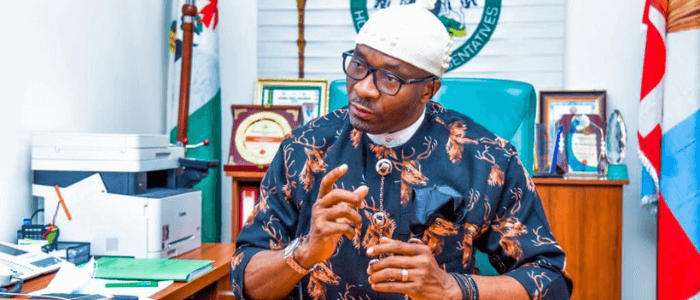
…solicits foreign direct investment into ailing health sector
Deputy Speaker of the House of Representatives, Hon. Benjamin Kalu, expressed concern over the capital flight worth over $1.1 billion lost to outbound medical tourism yearly.

Kalu, who stated this in Abuja while addressing the President of Montefiore Medicine, New York, USA, Dr. Phillip Ozuah, however, reiterated the present administration’s resolve towards improved funding for the health sector.
He said, “Regardless of the quality of our laws or the scale of our budgets, if preventable deaths continue, if maternal mortality remains high, and if citizens cannot recover from treatable illnesses, our development remains incomplete.

“In the 10th House of Representatives, health is regarded as central to national security, human capital development, and economic progress.
“The World Health Organisation estimates that every dollar invested in health returns four dollars in productivity gains. Nigeria has made notable strides: wild polio has been eradicated, maternal and child health services have expanded, and tertiary health institutions are reaching more Nigerians than ever before.
“Under President Bola Ahmed Tinubu’s Renewed Hope Agenda, the government has committed to bold reforms and citizen-focused policies, with the 2024 national budget allocating over N1.33 trillion to the health sector, the largest in our history.
“Yet, budgets alone do not deliver outcomes; resilient systems do. These systems must be purposefully designed, adequately equipped, and consistently strengthened through clear policy, sustained investment, and innovative partnerships.
“The 10th National Assembly has taken significant steps: Health coverage is now mandatory under the NHIA Act; The Basic Health Care Provision Fund has been expanded to support primary healthcare nationwide; Obsolete health laws have been modernized; Local pharmaceutical research is being promoted to boost domestic manufacturing; The Health Infrastructure Development and Regulation Bill has unified standards across the sector; The Medical Residency Training Fund (Amendment) Bill is advancing to stem brain drain; The National Assembly Clinic was commissioned as a model for public-sector healthcare delivery
“Despite these gains, government action alone is insufficient. Nigeria faces the dual challenge of declining international health aid and the annual loss of over $1.1 billion to outbound medical tourism.
“This mission is personal for me. Representing the South East, a region still healing from the legacy of conflict and underdevelopment, the promise of Reconstruction, Rehabilitation, and Reconciliation (3Rs) remains only partially fulfilled. Health reform is thus a critical pillar of my legislative agenda.
“Through the PISE-P initiative, we are rebuilding primary healthcare centres, training community health workers, and developing sustainable rural healthcare delivery models. I have sponsored the South East
Development Commission (SEDC) Bill to systematically address these gaps.
“My constituency projects include establishing and equipping rural health centres, organising medical outreaches such as free eye surgeries, and providing essential equipment to under-resourced clinics. I have also championed the rights and inclusion of persons with disabilities, recognising that dignity is integral to health.
“However, lasting transformation requires partnerships that harness global expertise and complement local initiatives. Dr. Ozuah, your leadership at Montefiore Medicine offers an unparalleled opportunity to align world-class medical knowledge with Nigeria’s urgent health priorities, particularly in tackling both communicable and non-communicable diseases.”
Speaking on some of the strategic partnerships embarked on, he informed the delegation of a proposed partnership to establish a specialised Medical Research and Training Centre in Nigeria, focused on cancer, kidney disease, diabetes, infectious diseases, and medical technology innovation. The centre, modelled after leading global institutions, would require collaboration with the Federal Government and credible local investors.
In the bid to strengthen Rural Health Infrastructure, Kalu disclosed that: “over 30,000 primary healthcare centres in Nigeria, especially in rural areas, remain under-equipped. Montefiore Medicine’s support, including donations of modern equipment and surplus technology from the United States, would have a transformative impact, particularly in historically underserved locations like Bende.”
Highlighting reforms aimed at reversing brain drain through knowledge exchange, he affirmed that “Nigeria’s medical diaspora is vast and highly skilled. We propose knowledge exchange initiatives,
training fellowships, research collaborations, telemedicine platforms, and AI-driven diagnostics to enable Nigerian professionals abroad to contribute to the domestic sector without permanent relocation.”
Speaking on the ongoing efforts to reduce the burden of outbound medical tourism, Kalu posited that: “Nigeria’s annual medical tourism bill, which once exceeded $1.6 billion, is now trending downward. Montefiore’s collaboration can accelerate this by developing centres of excellence that meet global standards and retain patients locally.
“We are witnessing a historic moment in Nigeria’s healthcare journey. On June 5, 2025, the African Medical Centre of Excellence (AMCE) was inaugurated in Abuja, a $300 million partnership between Afreximbank, King’s College Hospital London, and The Christie NHS Foundation Trust.
“This 170-bed facility, expanding to 500 beds, is the largest specialist private hospital in West Africa. It features five operating theatres, three catheter labs, West Africa’s largest ICU, a dedicated bone marrow transplant unit, and advanced laboratories. The AMCE houses Nigeria’s first 3T MRI, West Africa’s only PET/SPECT CT, two linear accelerators, and a brachytherapy machine, technologies previously unavailable on the continent.
“The AMCE will serve over 350,000 patients in its first five years, create 3,000 jobs, and provide clinical training and research opportunities for Nigerian professionals. Its mission is to reduce outbound medical tourism, strengthen local capacity, and foster intra-African medical excellence. Clinical support from King’s and oncology advisory from The Christie NHS Foundation Trust ensures that the highest standards of care are maintained. Plans are underway for a new medical and nursing school in partnership with King’s College London, further strengthening Nigeria’s health workforce.
“With a population exceeding 220 million, 60% of whom are under 25, Nigeria offers significant returns on healthcare investment. Strengthening our health sector is not just a national imperative, but a regional and global necessity.”
Credit: Nigerian Tribune
